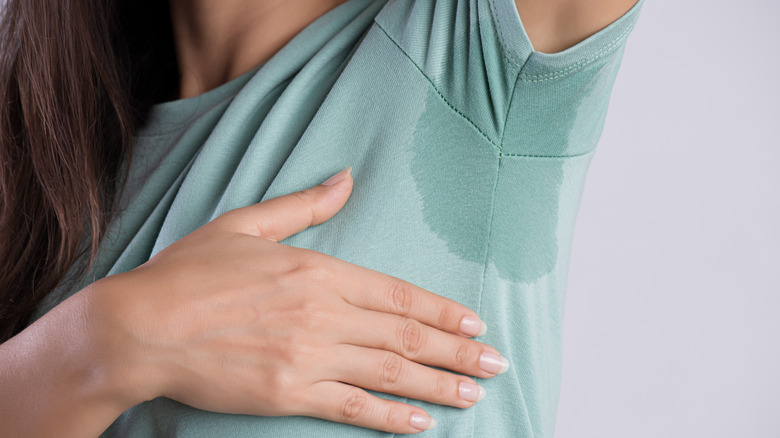Tips For Finding The Deodorant That Will Work Best For You
Did you know that there are people blessed with genes that render them unable to produce underarm odor? A study published in the Journal of Investigative Dermatology estimated that two percent of the population never have to experience smelly armpits in their lives. That's great for the genetic lottery winners, but what about the mere mortals among us? Most people have to take steps to avoid emitting a funky stench, and that means putting on deodorant.
Deodorant is specially formulated to mask or reduce the odor that develops in your armpit area, which is a breeding ground for bacteria because it's often warm, dark, and moist. And as it turns out, it's not that your body creates an unpleasant odor: The stench is a product of sweat and bacteria coming into contact with each other. When you have deodorant on, the less likely it is that the people around you will scrunch their noses, since it works hard to keep odor at bay.
With a lot of choices on the market, it can be confusing to know which deodorant will work best for you. According to experts, it's your body that should dictate your choice of deodorant. "If your deodorant is causing irritation or leaving too much residue on your skin and clothing, choose another," Dr. Alicia Zalka, a dermatologist, shared with Vogue. She advised that the fewer chemicals there are, the better, so as not to damage your skin. She also noted that if there's one ingredient you should avoid, it's aluminum, since it prevents your pits from producing sweat. "Aluminum-containing antiperspirants are lifesavers for some, but we don't all need aluminum in our day-to-day underarm care," she said. "It is possible to prevent odor without blocking sweat. Sweat is intentional; odor is preventable."
Choose a deodorant that responds to your body's unique needs
No one body is the same, so it's natural that no single deodorant can effectively neutralize everyone's odors. It may take some trial and error to arrive at the one deodorant that suits you, but ultimately, it all hinges on how your body reacts. When it comes to formula, it also depends on what your body needs, but your personal preferences should come into consideration, too.
Dr. Elizabeth Tanzi, co-director of the Washington Institute of Dermatologic Laser Surgery, told the Post Crescent that gels are ideal if you want to avoid staining your clothes, but they tend to be "sticky and a little drying." If you have armpit hair, you may want to use sprays, and if you shave, it's best to stick to, well, sticks. Apparently, they have "dimethicone in them that help soothe the skin." Meanwhile, creams are great for people with sensitive skin "because they're often packed with skin hydrators" that can help moisturize the area.
Deodorants versus antiperspirants
If you tend to sweat more than the average person or just more than you'd like, then you might find yourself reaching for antiperspirants rather than deodorants. More often than not, antiperspirants have aluminum content, but they don't exactly do much in concealing smells. "Antiperspirants [sometimes] contain aluminum salts that help plug your pores so you don't sweat as much," cosmetic chemist Randy Schueller told Teen Vogue. "These are over-the-counter drugs that are controlled by the FDA. Deodorants do not contain aluminum, and they don't stop you from sweating. They only reduce body odor, by using fragrance or antibacterial compounds."
Ultimately, choosing between a deodorant and an antiperspirant depends on your lifestyle. If you tend to hit the gym a lot or live in a place with a hotter climate, then an antiperspirant could work best for you, especially if you don't like the sweaty feeling. But if you're more concerned about possibly smelling unpleasant, you'll find better success at masking odors with deodorant. You may even want to use both, but avoid applying them one after the other. It's recommended that you apply an antiperspirant first after a bath, and then a deodorant a few hours later if you deem it necessary. Just remember not to opt for products with harsh chemicals to avoid harming your skin.


